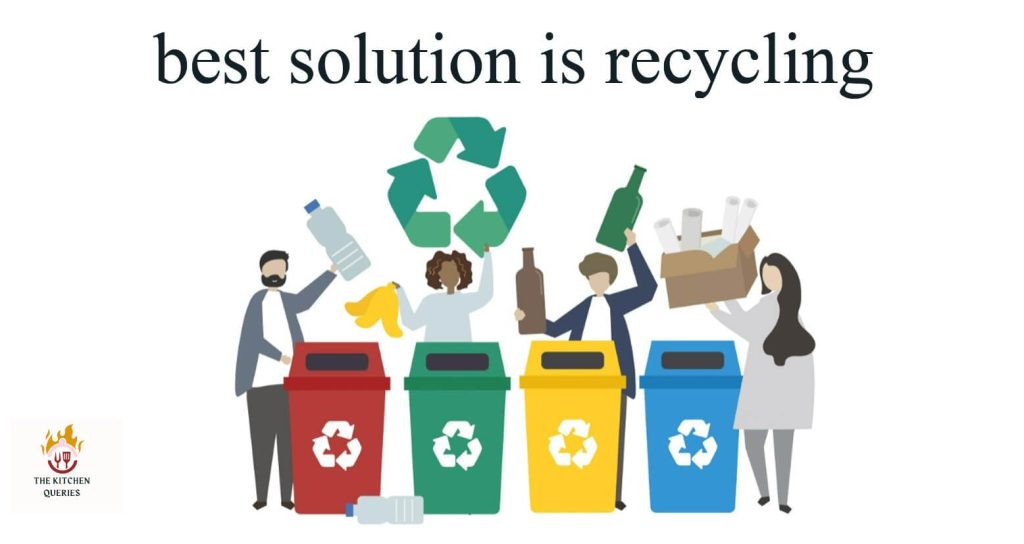Small Kitchen Appliances like toasters, blenders, and coffee makers can make our lives easier by saving time and effort in food preparation.
However, when these appliances break or are no longer needed, disposing of them can be challenging.
Simply throwing them away can harm the environment and violate local regulations.
Thus, it’s essential to understand how to dispose of small kitchen appliances properly.
This guide will provide an overview of the methods available for disposing of small kitchen appliances, including recycling, donation, and proper disposal techniques.
We will also discuss the benefits of these methods and how they can contribute to environmental sustainability.
With this information, you can decide how to dispose of your small kitchen appliances and ensure you do your part to protect the environment.
How Are Electronics Get Disposed of?

Electronic waste, or e-waste, can be disposed of in several ways. Unfortunately, some people may discard their electronics in the trash, which can lead to environmental pollution and risks to human health.
However, there are several more responsible and sustainable ways to dispose of electronics:
1. Recycling:
Recycling is the preferred method for disposing of electronics.
Many electronics contain valuable materials such as precious and rare earth metals, which can be extracted and reused in new products.
In addition, electronic devices may contain hazardous materials, such as lead and mercury, which must be disposed of properly to avoid environmental harm.
2. Donating:
Many electronics, particularly those still functional, can be donated to charitable organizations, schools, or community centers.
Donating electronics can extend their life and provide access to technology for people who may not have it.
3. Reselling:
Another option for disposing of electronics is to sell them.
Online marketplaces and secondhand stores are a great way to sell still functional electronics.
4. Trade-in Programs:
Some electronic retailers offer trade-in programs, allowing customers to exchange their old devices for store credit or discounts on new purchases.
This option helps dispose of old appliances and encourages people to upgrade to newer, more energy-efficient electronics.
Where to Take Your Small Kitchen Appliance for Recycling?

Recycling your small kitchen appliances is an excellent way to dispose of them while also contributing to preserving the environment.
Many small appliances contain metal, plastic, and glass, which can be recycled to create new products.
Here are some places where you can take your small kitchen appliances for recycling:
1. Local Recycling Centers:
Once the small appliances are sorted, dismantling separates materials such as metals, plastics, and electronic components.
This is an important step as it helps in appropriately recycling each material.
Dismantling uses specialized machinery to break down the appliances into smaller parts for easier recycling.
For example, copper wiring and plastic casings are separated from the main body of the appliance. Once dismantled, the various materials are then processed for recycling.
The metals, such as steel and aluminum, are melted down and reused for other products.
The plastics are also melted down and can be turned into new products.
Electronic components, such as circuit boards and wiring, are recycled separately to prevent harmful chemicals and toxins from being released into the environment.
Recycling centers play an important role in properly disposing of small appliances, ensuring they are recycled safely and sustainably.
2. Thrift Shops:
Small appliances can also be disposed of at thrift shops responsibly and sustainably.
When small appliances are donated to a thrift shop, they are first evaluated to determine if they are in good working condition.
If the appliance is in working condition, it may be cleaned and put up for sale.
This helps keep the appliance out of landfills while providing an affordable option for someone needing a small appliance.
If the appliance is not working, the thrift shop may recycle it or send it to an electronics recycling facility.
Sometimes, the thrift shop may partner with a recycling center or electronics recycling facility to ensure the appliance is recycled responsibly.
By donating small appliances to thrift shops, individuals can help reduce waste and support a sustainable and circular economy.
3. Charitable Organizations:
Small appliances can be disposed of at charitable organizations sustainably and responsibly.
Many charitable organizations accept small appliances as donations, provided they are in good working condition.
These organizations then clean and refurbish the appliances as needed and distribute them to those in need.
This ensures that the appliances are reused, reducing waste and preventing them from ending in landfills.
If the small appliance is not working, charitable organizations may partner with electronics recycling facilities or other recycling programs to ensure the proper disposal of the appliance.
By donating small appliances to charitable organizations, individuals can help support those in need while also promoting sustainability and reducing waste.
It is important to check with the organization beforehand to see if they accept small appliances and if there are any specific donation guidelines.
4. Transfer Stations:
Transfer stations collect and transfer waste from smaller collection vehicles to larger transport vehicles, transporting the waste to a landfill or recycling facility.
Some transfer stations may also accept electronic waste, including small appliances, for proper disposal.
Small appliances are first evaluated to determine if they can be recycled or reused when brought to a transfer station.
If the item is in working condition, it may be sold or donated to charitable organizations.
If the item cannot be reused, it is broken down into components, and the materials are recycled.
Transfer stations ensure that hazardous materials, such as batteries or chemicals, are disposed of properly to prevent environmental harm.
While transfer stations are not specifically designed to handle electronic waste, they can still be a viable option for disposing of small appliances responsibly and sustainably.
It’s important to check with the transfer station beforehand to see if they accept small appliances and if there are any specific guidelines for disposal.
5. Eco Drop Centers or Shops:
Eco drop centers or shops are a great option for disposing of small appliances in an environmentally friendly way.
These centers or shops specialize in accepting and processing electronic waste, including small appliances.
They work to ensure that the materials from these items are recycled and repurposed rather than ending up in landfills.
When small appliances are brought to an eco drop center or shop, they are evaluated to determine if they can be refurbished and resold or if they need to be recycled.
If the item can be repaired, it may be cleaned and refurbished, then sold at a discounted price.
If the item cannot be repaired, it is broken down into its components and recycled.
These centers or shops also ensure that hazardous materials, such as batteries, are disposed of properly.
By using eco drop centers or shops to dispose of small appliances, individuals can help promote sustainability and reduce waste.
6. Sell Them:
Selling small appliances is a good way to dispose of them while also earning money.
There are several ways to sell small appliances, including online marketplaces like eBay, Amazon, and Facebook Marketplace.
Before selling, it’s important to check the appliance’s condition and ensure it is in good working order.
Cleaning the appliance thoroughly and taking clear photos can also help attract potential buyers.
Pricing the appliance fairly is important, considering its age, condition, and any additional features or accessories it may come with.
Another option is to sell the small appliance at a garage sale or flea market.
This can be a good way to eliminate multiple items and attract potential buyers looking for bargains.
Selling small appliances helps reduce waste and promote sustainability and can also provide extra income.
7. To the dumpsters:
Dumpsters are not the appropriate place to dispose of small appliances.
Dumpsters are meant for general household waste and can harm the environment if small appliances are thrown in them.
Small appliances may contain hazardous materials, such as lead or mercury, which can contaminate the environment if disposed of improperly.
Additionally, many small appliances contain valuable materials that can be recycled and repurposed.
Instead of throwing small appliances in the dumpster, it’s important to consider other disposal options such as recycling, donating to charitable organizations, or selling.
By disposing of small appliances properly, we can help reduce waste and promote sustainability.
Who to Call for a Quick Rubbish Pick-up?

If you need a quick rubbish pick-up, there are several options you can consider depending on your location and the type of waste you need to dispose of.
Here are some of the people you can call for a quick rubbish pick-up:
1. Local Waste Management Services:
Many local governments offer waste management services, including rubbish pick-up.
Check with your local government to see if they provide this service and the pick-up schedule.
2. Private Waste Management Companies:
Private waste management companies offer residential and commercial clients rubbish pick-up services.
These companies often provide same-day or next-day pick-up, making them a good option if you need a quick rubbish pick-up.
3. Junk Removal Companies:
Junk removal companies specialize in removing unwanted items, including rubbish.
These companies often provide same-day or next-day pick-up, making them a good option if you need a quick rubbish pick-up.
4. Skip Bin Companies:
Skip bin companies provide large bins for rubbish disposal.
These companies will drop off the bin at your location and pick it up when it’s full.
This can be a good option if you have a lot of rubbish to dispose of and need a quick pick-up.
When calling for a quick rubbish pick-up, be sure to describe the waste you need to dispose of, as well as the location and any access restrictions that may be relevant.
This will help the service provider determine the best approach for removing the rubbish and ensure that the pick-up is completed efficiently and safely.
Am I Allowed to Dispose of My Kitchen Appliances?
There is generally no legal requirement to dispose of kitchen appliances, but local regulations or guidelines regarding their disposal may exist.
It is important to check with your local waste management or recycling facility to determine the proper disposal methods for your kitchen appliances.
However, it is important to note that disposing of appliances responsibly and sustainably is encouraged to reduce waste and promote environmental sustainability.
Many appliances can be recycled or repurposed, and disposing of them properly can help reduce the amount of waste in landfills and conserve valuable resources.
Additionally, donating or reselling working appliances can provide access to technology for people who may not have it and promote a circular economy.
Wrapping Up:
Responsibly and sustainably disposing of small kitchen appliances is important for promoting a circular economy and reducing waste.
There are several options for disposing of small appliances, including recycling, donating to charitable organizations, selling, and using eco drop centers or transfer stations.
When disposing of small appliances, it’s important to evaluate their condition and consider their potential for reuse or refurbishment before recycling or disposing of them.
By choosing to dispose of small appliances responsibly and sustainably, we can help reduce the amount of waste in landfills and promote the environment’s health.

I am a happy person. An adventurer. Currently wokring on different projects regarding SEO

